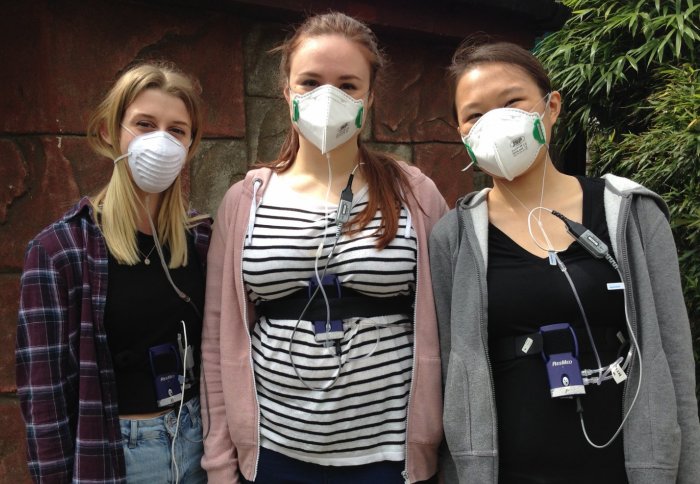How does the body react to roller coasters? Students test theme park rides
by Ben Campion

Imperial biomedical science students have worked with Thorpe Park Resort to test the physiological and psychological ups and downs of roller coasters.
The powerful and involuntary responses of the body and mind when riding theme park attractions has been studied by biomedical science students from Imperial College London working with engineers, technicians and educators at Thorpe Park Resort.
The project is part of the second-year biomedical science module ‘Physiology of Life under Pressure’, and saw the students using scientific and medical equipment specially adapted and securely attached to withstand the force of the rides in undertaking their experiments.
The BSc students measured their participants’ heart rate, heart rate variability, breathing patterns, oxygen saturation and the psychological effects of stress—before, during and after four popular attractions of differing ride experience.
In groups of eight, the students took turns to ride ‘The Swarm’, a winged rollercoaster; ‘Detonator’, a free-fall ride; ‘Zodiac’, a tilting, centrifugal ride; and ‘Quantum’, a flat platform ‘magic carpet’ ride.
The students’ main findings were:
- ‘The Swarm’ was associated with periods of involuntary apnoea (breathhold) during high G-force turns.
- ‘Zodiac’ usually caused a 30% increase in heart rate that started to fall after the midway point of the ride (once it had started to decelerate). Previous experience of the ride had no effect on the physiological and psychological responses.
- Heart rate response on ‘Detonator’ was proportional to self-perceived anxiety.
- ‘Quantum’ was associated with a higher breathing rate before and during the ride, compared with after. Also, breathing frequency dropped briefly during the low-velocity directional change midway through the ride.
Dr James Moss, a teaching fellow within Imperial’s National Heart and Lung Institute, explains that the field trip gives the students the opportunity to prepare for and undertake data collection in a real-world environment to answer applied physiology research questions.
“This project gives our second-year biomedical science students the opportunity to organise roles and responsibilities within a data collection team and collect data according to predetermined protocols, just as they will go on to do in academia or industry,” he explains.
“It’s a practical and engaging opportunity for our undergraduate students to process and analyse a large amount of data, to test an original hypothesis, and communicate scientific information to a scientific audience using literature to discuss and support their findings.”
Experimental set-up
The BSc students tested their participants’ physiological state using a CamNtech Actiwave for continuous one-lead electrocardiogram (ECG) monitoring and tri-axial accelerometry, and a ResMed ApneaLink which includes a cannula to measure nasal airflow, chest-mounted pressure band to detect breathing and a finger-mounted pulse oximeter to measure oxygen saturation.
After data processing, heart rate, heart rate variability, breathing patterns (including apnoea), oxygen saturation and movement could be analysed, whilst questionnaires were used to determine psychological responses to stress.
A number of adaptations had to be made to ensure the security of the devices and sensors, with safety loops, Velcro straps and elastic borders—plus plenty of sticky tape. Participants were asked to “refrain from screaming” to protect the efficacy of the airflow signal, making for an unusually quiet experience.
Collaboration
Key to the success of the project was the collaboration between Imperial and Thorpe Park Resort.
“The learning potential of our Resort is limited only by imagination,” said Thorpe Park Resort education manager Jack du Pille. “Our job is to help teachers structure their learning around a fascinating educational destination.
“With resources and unique on-site learning opportunities, Thorpe Park Resort is proud to have contributed to the educational experience—and increased heart rates—of these students.”
New programmes from 2017
“This field trip is a prime case study of how Imperial students explore real scientific hypotheses and are given opportunities to design, choose and perform experiments,” explains Dr Chris John, Head of BSc Biomedical Science.
“Our students learn to think like scientists by being scientists from the start of their course.”
Research into human health is moving fast and Imperial will launch two innovative biomedical science undergraduate programmes in 2017: Medical Biosciences and Medical Biosciences with Management.
Students joining BSc Medical Biosciences will be taught in environments that closely mirror authentic biomedical research and pose ‘real world’ questions.
“Students will explore the science underpinning medicine and its related fields, the principles and practice of biomedical science, and how they are applied in research, policy and industry,” explains Dr Ana Costa-Pereira, Head of BSc Medical Biosciences.
“Interactive lectures and research-based laboratory practicals will teach students to behave as scientists, developing a wealth of analytical and transferable skills that will offer them an edge upon graduation.”
Dr James Moss would like to acknowledge the support of Alison Wimms of ResMed, Natalie Fitzpatrick of UCL and Jack du Pille of Thorpe Park Resort with this project.
Article text (excluding photos or graphics) © Imperial College London.
Photos and graphics subject to third party copyright used with permission or © Imperial College London.
Reporter
Ben Campion
Faculty of Medicine Centre
